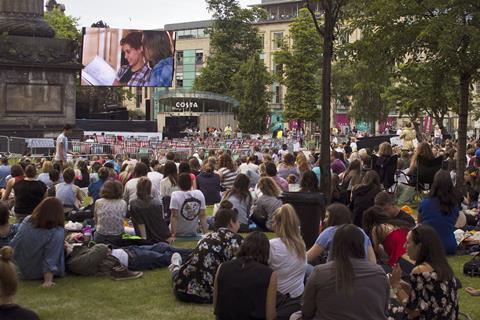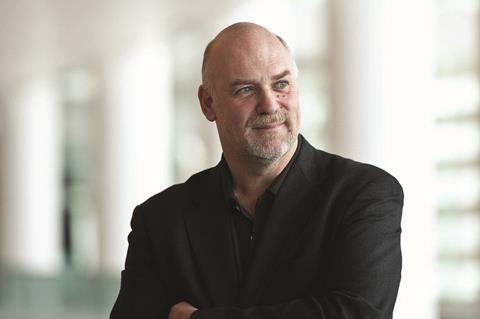Edinburgh International Film Festival (June 20 – July 1) faces tough competition in its slot, but there are enough good titles to go around, artistic director Mark Adams tells Screen.

Some festival directors are renowned for their outsize ego, but graceful geniality has served Mark Adams well. Now in his fourth year as artistic director of the Edinburgh International Film Festival, he’s plotted a steady course, dodging the long shadow cast by the event’s illustrious past, while calmly accepting the challenge of ever-tougher competition within EIFF’s summer slot. “You have to be pragmatic” is an oft-used phrase.
Adams inherited his post from Chris Fujiwara (2012-14), who had brought some stability back to the operation after the rocky year of 2011 when there was no artistic director at the helm. And Adams – who prior to joining EIFF was reviews editor for Screen International – has needed all his skills of diplomacy to woo distributors and sales agents, especially in the face of Sundance London’s 2016 move from April to June. Film4’s Summer Screen season at London’s Somerset House in August is another competitor for titles – it hosted the UK premiere of Ruben Ostlund’s The Square last year, and this year closes with Bart Layton’s hot Sundance entry American Animals.
“You can never worry too much about that,” responds Adams. “There are always films that you love and don’t come to you for all number of reasons. There are some films this year we have approached that have gone to Sundance London or will be in Sheffield [Doc/Fest, also in June], and that always happens. If you get hung up about it, it will drive you crazy. I know some festival directors do get angry when they don’t get stuff, but there are lots of amazing films out there.”
Having opened the 2017 event rather triumphantly with Francis Lee’s God’s Own Country – the eventual winner of the festival’s Michael Powell Award, going on to be a Bafta nominee, multiple British Independent Film Awards winner and UK box office hit – Adams may have felt pressure to match that standard this time around. In the event, he has selected Marc Turtletaub’s Puzzle, another Sundance title, starring Scotland’s Kelly Macdonald as a suburban mother whose life changes when she discovers a passion for solving jigsaw puzzles. The closing film is Oliver Parker’s Swimming With Men, starring Rob Brydon as a man whose midlife crisis takes him into an all-male synchronised swimming team.

June move
Ten years after the event’s dating switch from August, when it was concurrent with the main Edinburgh festival, to June – a move designed to give it more breathing room before autumn’s BFI London Film Festival – Adams and EIFF chief executive Ken Hay are still fielding questions about the switch. “Why aren’t you in August because I want to go to the theatre?” is a refrain Adams still hears. “In August, hotels are triple in price. Air fares are triple. Trains go crazy. Venues are not available.” Hay expresses it more positively: “The decision to move to June was a very good and brave one. It’s given us the city to play with. In the world’s leading festival city, we have access in June to some of the best venues around.”
Those sites include the huge-capacity Festival Theatre, which hosts the big gala events – this year including Pixar’s Incredibles 2. The Traverse Theatre hosts In Person talks with actor George MacKay (who stars in festival title The Secret Of Marrowbone) and with Stephen Moyer and Anna Paquin (their The Parting Glass screens as this year’s People’s Gala – an initiative that offers local audiences the chance to attend a red-carpet world premiere at a major venue for just £5).
In 2017, the festival expanded its cinema footprint with a smattering of screenings across five days at the Vue Omni in Leith; this year, the Vue joins Cineworld, Odeon and Filmhouse as a major festival venue on all 11 days.
Ticketed admissions have been on a steady climb since the 2011 lowpoint, increasing from 34,500 that year to 53,000 in 2017 – higher than they were back in 2008. In addition, sunshine brought 20,000 to outdoor free screenings last year. The impact of a warm Edinburgh reception can be measured when a film goes on to have its UK cinema release: Bill Pohlad’s Love & Mercy and Taika Waititi’s Hunt For The Wilderpeople are examples of EIFF titles that went on to achieve particular box office success in the city. And the festival can also provide a sales platform.
“We had it with Edie last year, a small British film which came through submissions, sold out its screenings, got picked up by Arrow, played other festivals and secured a UK release,” says Adams. Arrow released into 105 UK cinemas on May 25.
Solid finances
“The hard times came when the financial crisis happened, and those big sponsorship deals went away,” says Adams, and it’s true that financial institutions previously partnering with the EIFF in various capacities – such as Bank of Scotland and Standard Life – are no longer involved. On the other hand, the height of the financial crisis, from 2008-10, also happened to be the period that the UK Film Council allocated a total of £1.8m to the festival to help it achieve its date switch.
The EIFF now instead receives an annual £150,000 from the BFI – “which we are very grateful for,” says Hay, who adds that Creative Scotland is the single biggest supporter from the public sector. Other public funders are the Scottish Government, the City of Edinburgh Council and Event Scotland. New partners this year include Netflix, supporter of the festival’s industry centre, and Mackays jams, sponsor of the Film Fest in the City outdoor screenings. These popularly programmed screenings in fact run the weekend before the festival proper, and provide a vital marketing and ticket-sales opportunity, engaging a broader local audience.
“What we have achieved over the past few years is a steady increase in the number of sponsors, trusts and foundations and individual donors getting involved in the festival, based on that broader view of what the festival can do,” says Hay. “We are constantly looking to evolve, develop the festival to reflect where the world of film and cinema is at. Public funding has held up, but declined in terms of percentage of the overall budget, which has gone up.”
Hay adds that it’s easier to generate commercial sponsor support for special events and wider activities than for the basic programme. “Film is at the heart of the festival, but it’s the stuff around it that others tend to get interested in. A lot of the sponsors and supporters are looking at how they can help us add value.”
One example in 2018 is a partnership with Scotland’s Year of Young People. In celebration of this year-long event, the festival has introduced a new strand: The Young and the Wild, which is co-curated by a team of young programmers and receives support from investment managers Baillie Gifford. Titles include Toby MacDonald’s Film4-backed feature debut Old Boys, starring Alex Lawther, which also appears in Best of British and is competing for the Michael Powell Award.
Industry events
Edinburgh’s industry strand includes a works-in-progress section, showcasing ten UK projects to sales agents, financiers and festivals, with a £2,500 prize. Last year’s winner, documentary Piano To Zanskar, has gone on to completion, and plays EIFF this year.
Adams explains that the first few days of the festival are tailored to the needs of industry guests, with press and industry screenings frontloaded with new titles during this period. “Between opening night and the ceilidh [on the first Saturday] is a very popular period,” he says. “People can come for a few days.”
The presentation of new work, including 11 world premieres in the Best of British section, will inevitably be the focus for buyers – but, perhaps ironically, it’s in the retrospective strands where the festival has the best opportunity to reflect the zeitgeist. This year Adams presents American Woman: Female Directors in American Cinema 1980-1990, featuring Amy Heckerling, Kathryn Bigelow and Penelope Spheeris. “With new films you are beholden to the films,” says Adams. “You can try and force them into a narrative, but perhaps you can’t. With retrospective programming, you can reflect something that might be happening. You can tell a story.”















![[L-R]: Amanda Villavieja, Laia Casanovas, Yasmina Praderas](https://d1nslcd7m2225b.cloudfront.net/Pictures/274x183/6/4/1/1471641_pxl_20251224_103354743_618426_crop.jpg)








![[L-R]: Amanda Villavieja, Laia Casanovas, Yasmina Praderas](https://d1nslcd7m2225b.cloudfront.net/Pictures/100x67/6/4/1/1471641_pxl_20251224_103354743_618426_crop.jpg)
No comments yet